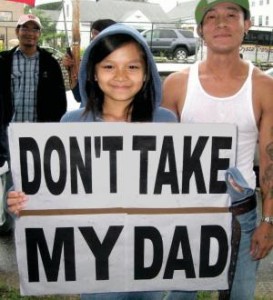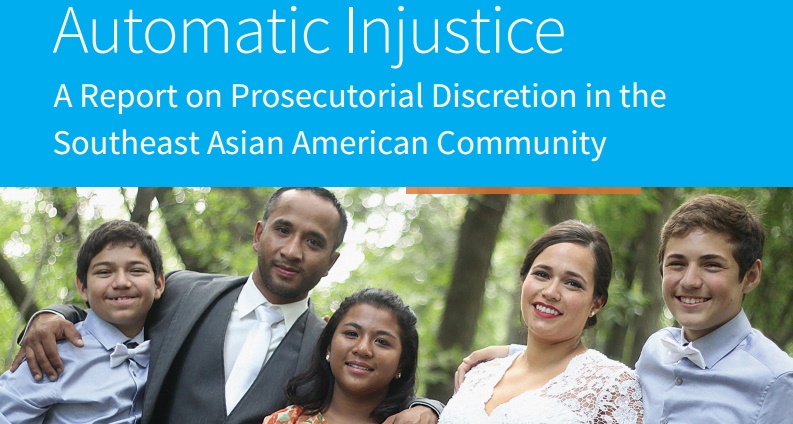On Wednesday, October 26, I attended a webinar for the launch of the Southeast Asia Resource Action Center (SEARAC)’s new report, “Automatic Injustice: A Report on Prosecutorial Discretion in the Southeast Asian American Community.” The Southeast Asian American (SEAA) community has been heavily impacted by automatic, mandatory criminal deportation policies. This community faces unique struggles as refugees, which have made them vulnerable to high levels of criminalization over the last four decades. SEAA families are routinely torn apart by these policies, with individuals being deported to countries they once fled – or countries in which they have never actually set foot. When our families are dismantled, it means less support, fewer caregiving options, trauma, illness, stress, and so much more.
Katrina Dizon Mariategue, Immigration Policy Manager for SEARAC, kicked off the webinar by introducing SEARAC and this important new report, which you can read and download on our website. This report began as a memo that SEARAC wrote to the Department of Homeland Security (DHS) earlier in 2016. SEARAC traveled to Los Angeles, Seattle, and Philadelphia to talk with Immigration and Customs Enforcement (ICE) offices in those areas, which represent the three cities with the largest numbers of Southeast Asian Americans currently detained. At least 16,000 Southeast Asian American community members have received orders for deportation, 12,000 of which were based on old criminal records, despite many of those individuals having reformed their lives – and all of them having served their time.
Jose Magana-Salgado of the Immigrant Legal Resource Center spoke next, talking about the process that ILRC, SEARAC, and others have gone through in order to get cases reviewed before individuals are deported. Since 2015, ICE has granted only about 100 appeals. So, what can we do to improve this process? Jose suggests that advocates contact their legislators who may be sympathetic to the plight of our communities: we can ask our elected officials to write letters to the Department of Homeland Security and the Immigration and Customs Enforcement officials, encouraging them to show more discretion in these cases. We can also highlight the stories of individuals and families facing deportation through the media, social media, and our websites. (If you have a story about immigration and deportation that you would like to share with us, check out the Diverse Elders Stories Initiative!)
 The final speaker on the webinar was Jenny Srey. Jenny’s husband, Ched Nin, was detained along with seven other Cambodian individuals in Minnesota earlier this year. Ched has lived in Minnesota for 30 years and has never been to Cambodia; his family fled that country because of war and genocide occurring there. Jenny has been working tirelessly since her husband’s detention to engage policymakers and the media. “We’ve been working super-hard to convince ICE that it’s actually a benefit to have my husband remain in the community, and that he’s really American. He has a Minnesota accent,” Jenny said. “We can’t understand why people won’t help us save our families.” Ched and Jenny have five children, and Ched is also the primary caregiver for his elderly father, illustrating the devastating reach across generations that a deportation can have on a family and community. Mari Quenemoen of SEARAC wrote a blog post for the Diverse Elders Coalition in 2013 about this very issue. You can read that blog by clicking here, and you can learn more about Ched’s case and take action on the Release MN 8 Facebook page.
The final speaker on the webinar was Jenny Srey. Jenny’s husband, Ched Nin, was detained along with seven other Cambodian individuals in Minnesota earlier this year. Ched has lived in Minnesota for 30 years and has never been to Cambodia; his family fled that country because of war and genocide occurring there. Jenny has been working tirelessly since her husband’s detention to engage policymakers and the media. “We’ve been working super-hard to convince ICE that it’s actually a benefit to have my husband remain in the community, and that he’s really American. He has a Minnesota accent,” Jenny said. “We can’t understand why people won’t help us save our families.” Ched and Jenny have five children, and Ched is also the primary caregiver for his elderly father, illustrating the devastating reach across generations that a deportation can have on a family and community. Mari Quenemoen of SEARAC wrote a blog post for the Diverse Elders Coalition in 2013 about this very issue. You can read that blog by clicking here, and you can learn more about Ched’s case and take action on the Release MN 8 Facebook page.
Katrina wrapped up the webinar by sharing some of SEARAC’s recommendations from their new report. SEARAC urges the Department of Homeland Security and Immigration and Customs Enforcement to clarify guidelines for deportation and recognize that crimes committed as minors, length of time in the US, refugee status, family ties, and rehabilitation should be considered when making rulings about deportation. SEARAC also recommends that more data is collected and reported by DHS and ICE, including name, location, age, ethnicity, country of origin, description of crime, and more. This will help organizations like SEARAC to evaluate the number of deportation cases being processed and advocate for the individuals facing deportation.
We stand with SEARAC and other communities unfairly facing deportation from the United States. Our families deserve to remain whole, and we reject the “families not felons” fallacy that is wreaking havoc on communities of color and LGBTQ communities in our nation. We hope that DHS and ICE will listen to our stories and the stories of our family members, friends, communities, and advocates and institute positive change as soon as possible. And remember: these departments and their policies are driven by the officials we have elected, so don’t forget to vote this election day.
The opinions expressed in this article are those of the author and do not necessarily reflect those of the Diverse Elders Coalition.


